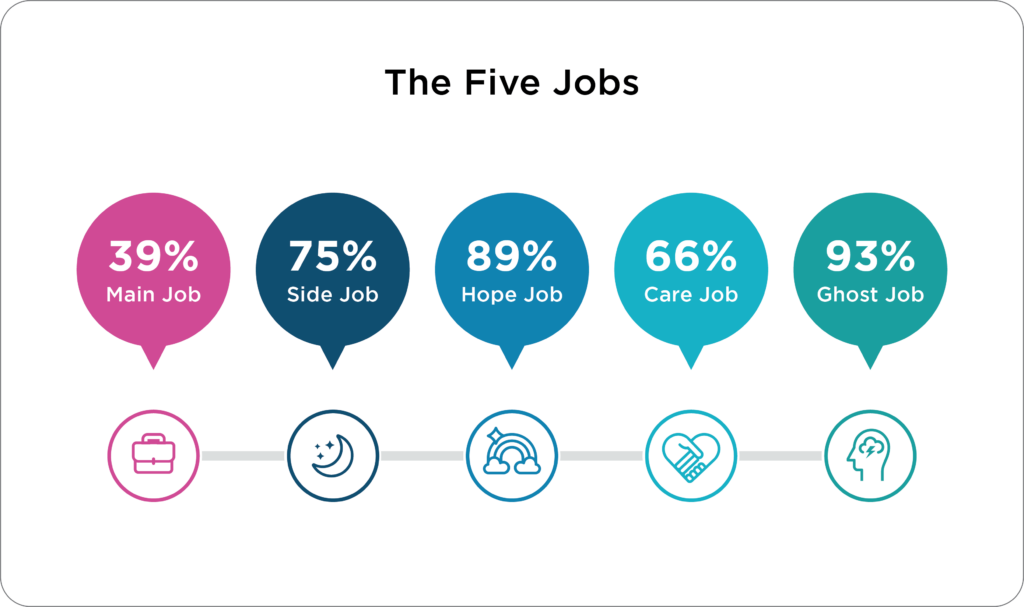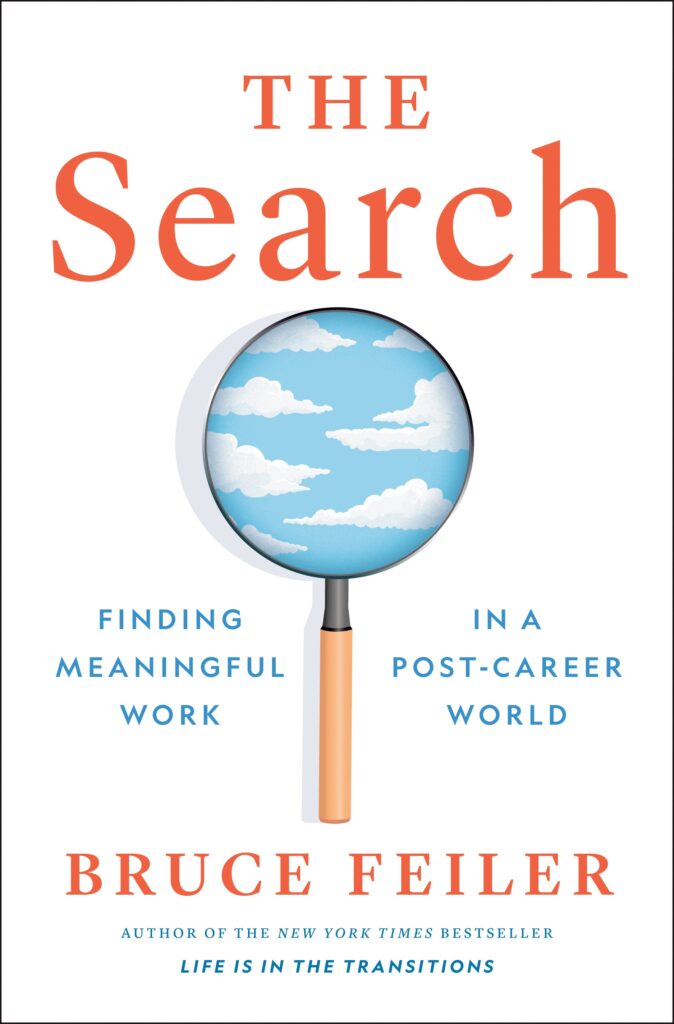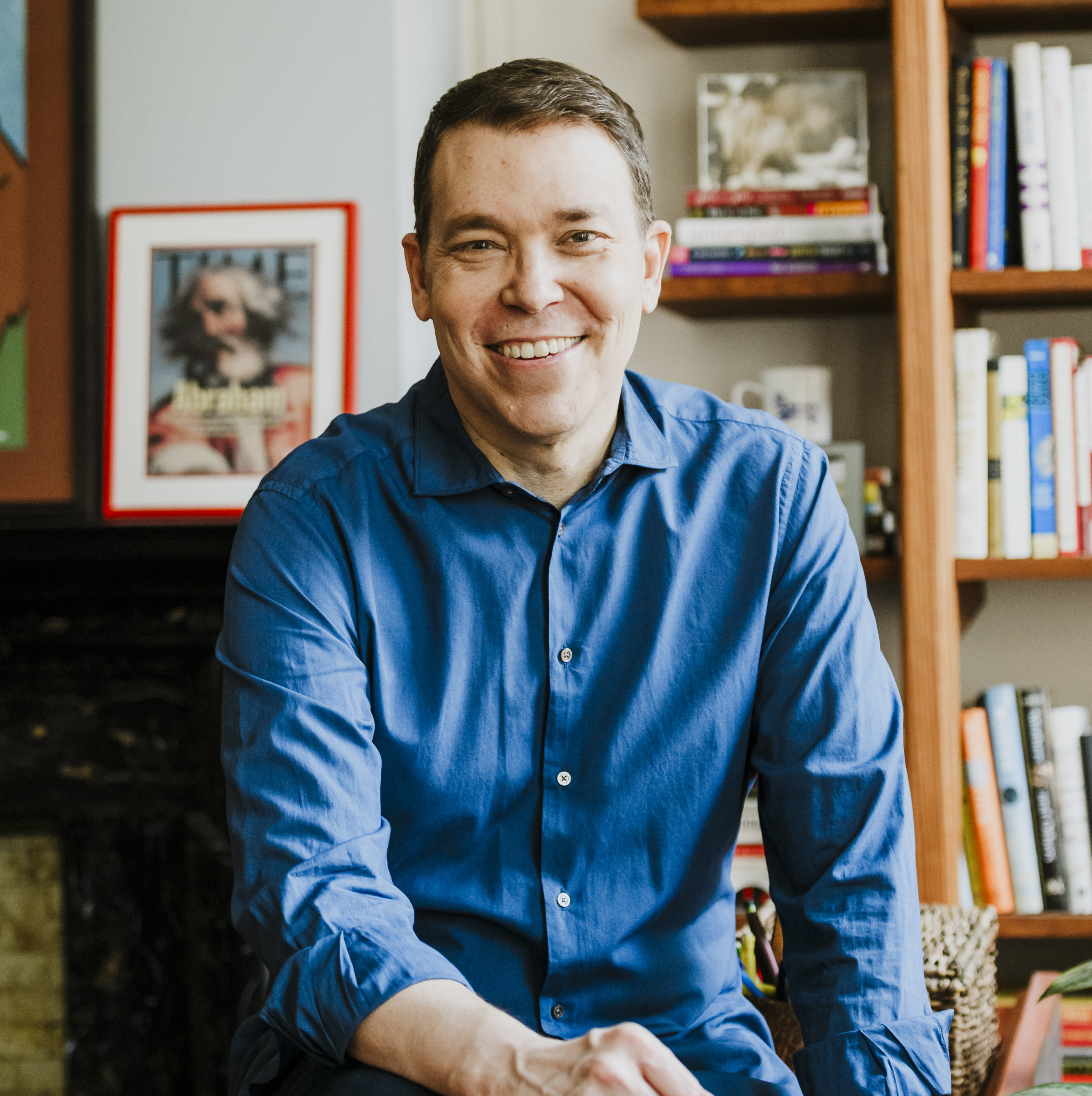America is at a once-in-a-generation turning point around work: 70% of us are unhappy with what we do; three-quarters of us say we plan to look for new work this year; two-thirds of us are rethinking where, when, and how we work.
Add those number up and that means every day, 100 million Americans sit down with someone they love and say, “I’m not happy with what I’m doing and want to do something else.”
I’ve spent the last six years crisscrossing the United States trying to help people answer that question more effectively. I’ve collected and analyzed 400 life stories of Americans of all ages, all backgrounds, and in all 50 states. The simple question I’ve been asking: As life becomes chaotic and the pace of change quickens, how can we navigate the growing number of transitions we all face with meaning, purpose, and joy?
On the urgent topic of how we spend the bulk of our time, the answer involves rejecting the three lies of work and embracing the one truth.
Lie #1: You have a career. For most of human history, humans lived where they worked and worked where they lived. There was no word for ‘career.’ The idea of the career was invented a century ago as Americans fled to big cities and needed a way to find work. The résumé was invented soon after as a way to chronicle our linear careers.
Today, we’ve retired that linear idea. Sure, some people lock into a dream early and follow it for decades. But far more of us rethink our choices, find new passions, and break away from stifling expectations. In my study, 85 percent of people who loved what they do said they did not “follow their passion” when they were young; instead they discovered it, created it, or changed it along the way.
Lie #2: You have a path. All the metaphors we’ve used to describe the career—the track, the path, the ladder—have one thing in common: they reinforce the idea that work is linear. By contrast, our work lives today are nonlinear.
My data show that the average person goes through 20 workquakes in their lives—that’s one every 2.85 years. A workquake is a moment of rethinking, reevaluating, or reconsidering what you do. Women go through workquakes more frequently than men; Gen Xers go through them more frequently than boomers; millennials more frequently than Xers. As the workforce becomes younger and more diverse, that pace is only going to quicken.
Lie #3: You have a job. The old script that everybody has a job they go to during the day, then retreat to personal time at night no longer applies to how most people approach work. No one has just one job anymore; most of us have up to five.
These include a main job, though by some measures fewer than half of us even have one of those anymore; a care job, like caring for children or aging relatives; and a side job that we perform for love or money.
But I also kept hearing about two other types of jobs so frequently that I decided to name them. One is a hope job, which is work we do that we hope leads to something else, like writing a sci novel or crocheting scarves to sell at a local boutique. More than 8 in 10 of us have a hope job, with many of us paying out of pocket for the privilege.
The second is a ghost job, an invisible specter that haunts us so much it feels like a job. Nine out of 10 of us have a ghost job like battling self-doubt, discrimination, mental health, or financial insecurity.

Instead of feeling overwhelmed by all these jobs, we take advantage of this mix to find the meaning out of work that we demand. Maybe we one job we do for salary and benefits but another we do for self-expression or a sense of giving back.
In place of these three lies, Americans of all ages are embracing the one truth: Only you can decide what meaning is most important to you. Only you can write your own story of success.
How do you do that? The answer to that question may be the biggest surprise of all. The people who are happiest and most fulfilled at work don’t just climb; they also dig. They perform what I call a “meaning audit,” using personal archaeology to unearth the story of work they’ve been trying to tell their entire lives. My new book, The Search: Finding Meaningful Work in a Post-Career World, introduces a new toolkit for doing just that, 21 Questions to Find Work You Love.
Here are 5 questions you can ask right now:
1. The most important person in my work choices right now is ________________?
Part of the challenge of telling a work story is that we’re not the only people in those stories. We’re all shaped by the needs of others, from our parents to our children to our partners. Right now, whose voices are most prominent for you? Perhaps you’re choosing to spend more time with your children; commit more time to a volunteer organization; or focus on yourself for a while. The blessing of the nonlinear life is you can change your decision at any point.
2. At this moment in my life, I want to do work that ________________?
What we want to do also changes over time. At one point we may value salary, while at another we may emphasize creativity, public service, or giving back. A central part of being happy at work is knowing what you want to do at this moment in your life.
3. I want to work in a place where _______________?
Place may be the part of work that’s been most upended by the pandemic. With the rise of remote work, two-thirds of Americans are renegotiating once unquestionable topics like how often they go into the office and whether they can live in more pleasant surroundings and give up soul-crushing commutes. What kind of work environment is more important to you at this time?
4. My purpose right now is _______________?
Your why is also not fixed. It shifts and adapts as you grow, learn, and get to know yourself better. What is your purpose right now—not 2 years ago, not 10 years ago, today?
5. The best advice I have for myself right now is _______________?
The final revelation of my conversations is that while all of us seek out advice when we’re going through a work transition, the best advice turns out to be “trust yourself.” Three-quarters of people told me that what they found most helpful was when people told them to listen to their gut. They didn’t want a kick in the rear; all they wanted was a pat on the back.
Listen to yourself may be the most important lesson of all: In the new world of work, you don’t have to follow someone else’s dream; you can follow your own. Make yourself the hero of your own story.

BRUCE FEILER is the author of seven New York Times bestsellers, including LIFE IS IN THE TRANSITIONS, THE SECRETS OF HAPPY FAMILIES, and COUNCIL OF DADS. His three TED Talks have been viewed more than four million times, and he teaches the TED Course HOW TO MASTER LIFE TRANSITIONS. His latest book, from which this piece is adapted, is THE SEARCH: Finding Meaningful Work in a Post-Career World.


